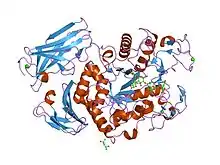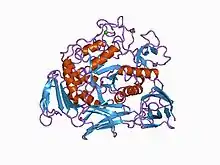Glycoside hydrolase family 13
In molecular biology, glycoside hydrolase family 13 is a family of glycoside hydrolases.
| Alpha amylase, N-terminal ig-like domain | |||||||||
|---|---|---|---|---|---|---|---|---|---|
 crystal structure of thermoactinomyces vulgaris r-47 alpha-amylase 1 (tvai) mutant d356n/e396q complexed with p2, a pullulan model oligosaccharide | |||||||||
| Identifiers | |||||||||
| Symbol | Alpha-amylase_N | ||||||||
| Pfam | PF02903 | ||||||||
| InterPro | IPR004185 | ||||||||
| SCOP2 | 1sma / SCOPe / SUPFAM | ||||||||
| |||||||||
| Alpha-amylase catalytic domain | |||||||||
|---|---|---|---|---|---|---|---|---|---|
 cyclodextrin glucanotransferase (e.c.2.4.1.19) (cgtase) | |||||||||
| Identifiers | |||||||||
| Symbol | Alpha-amylase | ||||||||
| Pfam | PF00128 | ||||||||
| Pfam clan | CL0058 | ||||||||
| InterPro | IPR006047 | ||||||||
| SCOP2 | 1ppi / SCOPe / SUPFAM | ||||||||
| CAZy | GH13 | ||||||||
| |||||||||
Glycoside hydrolases EC 3.2.1. are a widespread group of enzymes that hydrolyse the glycosidic bond between two or more carbohydrates, or between a carbohydrate and a non-carbohydrate moiety. A classification system for glycoside hydrolases, based on sequence similarity, has led to the definition of >100 different families.[1][2][3] This classification is available on the CAZy web site,[4][5] and also discussed at CAZypedia, an online encyclopedia of carbohydrate active enzymes.[6][7]
Enzymes containing this domain belong to family 13 (CAZY GH_13) of the glycosyl hydrolases. The maltogenic alpha-amylase is an enzyme which catalyses hydrolysis of (1-4)-alpha-D-glucosidic linkages in polysaccharides so as to remove successive alpha-maltose residues from the non-reducing ends of the chains in the conversion of starch to maltose. Other enzymes in this family include neopullulanase, which hydrolyses pullulan to panose, and cyclomaltodextrinase, which hydrolyses cyclodextrins.
References
- Henrissat B, Callebaut I, Fabrega S, Lehn P, Mornon JP, Davies G (July 1995). "Conserved catalytic machinery and the prediction of a common fold for several families of glycosyl hydrolases". Proceedings of the National Academy of Sciences of the United States of America. 92 (15): 7090–4. Bibcode:1995PNAS...92.7090H. doi:10.1073/pnas.92.15.7090. PMC 41477. PMID 7624375.
- Davies G, Henrissat B (September 1995). "Structures and mechanisms of glycosyl hydrolases". Structure. 3 (9): 853–9. doi:10.1016/S0969-2126(01)00220-9. PMID 8535779.
- Henrissat B, Bairoch A (June 1996). "Updating the sequence-based classification of glycosyl hydrolases". The Biochemical Journal. 316 (Pt 2): 695–6. doi:10.1042/bj3160695. PMC 1217404. PMID 8687420.
- "Home". CAZy.org. Retrieved 2018-03-06.
- Lombard V, Golaconda Ramulu H, Drula E, Coutinho PM, Henrissat B (January 2014). "The carbohydrate-active enzymes database (CAZy) in 2013". Nucleic Acids Research. 42 (Database issue): D490–5. doi:10.1093/nar/gkt1178. PMC 3965031. PMID 24270786.
- "Glycoside Hydrolase Family 13". CAZypedia.org. Retrieved 2018-03-06.
- CAZypedia Consortium (December 2018). "Ten years of CAZypedia: a living encyclopedia of carbohydrate-active enzymes" (PDF). Glycobiology. 28 (1): 3–8. doi:10.1093/glycob/cwx089. PMID 29040563.